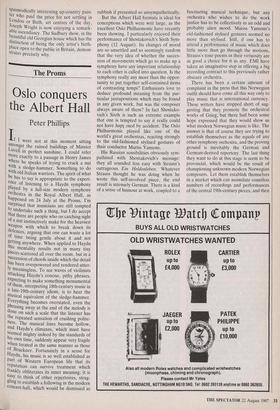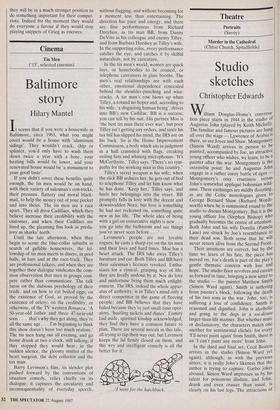The Proms
Oslo conquers the Albert Hall
Peter Phillips
If I were not at this moment Sitting amongst the ruined buildings of Minster Lovell in perfect sunshine, I could refer more exactly to a passage in Henry James Where he speaks of trying to crack a nut with a sledge-hammer. Something to do With old Italian warriors. The spirit of what he has to say is appropriate to the experi- ence of listening to a Haydn symphony played by a full-size modern symphony orchestra in the Royal Albert Hall, as happened on 24 July at the Proms. I'm surprised that musicians are still tempted to undertake such a thing, but I do accept that there are people who on catching sight of a nut instinctively make for the heaviest Weapon with which to break down its defences, arguing that one can waste a lot of time being gentle about it and not getting anywhere. When applied to Haydn this mentality results not in many tiny pieces scattered all over the room, but in a succession of chords inside which the detail has been overpowered and rendered utter- ly meaningless. To see waves of violinists attacking Haydn's concise, pithy phrases, expecting to make something monumental of them, interpreting 18th-century music in a late-19th-century idiom, is to hear the musical equivalent of the sledge-hammer. Everything becomes overstated, even the phrasing away at the end of the melody is done on such a scale that the listener has the repeated sensation of crushing polite- ness. The musical lines become hollow, and Haydn's climaxes, which must have seemed mighty indeed by the standards of his own time, suddenly appear very fragile when treated in the same manner as those of Bruckner. Fortunately in a sense for Haydn, his music is so well established as Part of Western European life that its reputation can survive treatment which frankly obliterates its inner meaning: it is easy to think of other repertoires, strug- gling to establish a following in the modern concert-hall, which would be dismissed as
rubbish if presented so unsympathetically.
But the Albert Hall formula is ideal for conceptions which were writ large, as the excellent Oslo Philharmonic have recently been showing. I particularly enjoyed their performance of Shostakovich's Sixth Sym- phony (12 August). Its changes of mood are so unsettled and so seemingly random that the very idea of whether the succes- sion of movements which go to make up a symphony have any important relationship to each other is called into question. Is the symphony really any more than the oppor- tunity to put together self-contained items of. contrasting tempi? Enthusiasts love to deduce profound meaning from the par- ticular juxtapositions which may be found in any given work, but was the composer always aware of them? In fact Shostako- vich's Sixth is such an extreme example that one is tempted to say it really could not have hapj.tned by accident. The Oslo Philharmonic played like one of the world's great orchestras, reacting strongly to the old-fashioned stylised gestures of their conductor Mariss Yansons.
His Russian sensibilities obviously sym- pathised with Shostakovich's message: they all sounded less easy with Strauss's outrageous Ein Heldenleben. Whatever Strauss thought he was doing when he wrote this self-involved piece, the end result is intensely German. There is a kind of a sense of humour at work, coupled to a
fascinating musical technique, but any orchestra ,who wishes to do the work justice has to be collectively in an odd and probably alien mood. Mariss Yansons's old-fashioned stylised gestures seemed no more than stylised. Still, if one has to attend a performance of music which does little more than go through the motions, Strauss's tone-poems in their virtuosity are as good a choice for it as any. EMI have taken an imaginative step in offering a big recording contract to this previously rather obscure orchestra.
There has been a certain amount of complaint in the press that this Norwegian outfit should have come all this way only to play music that is international currency. These writers have stopped short of sug- gesting that they promote the orchestral works of Grieg, but there had been some hope expressed that they would show us what modern Norwegian music is like. The answer is that of course they are trying to establish themselves as the equals of any other symphony orchestra, and the proving ground is inevitably the German and German-derived repertory. The last thing they want to do at this stage is seem to be provincial, which would be the result of championing unknown modern Norwegian composers. Let them establish themselves in a market which can assimilate countless numbers of recordings and performances of the central 19th-century pieces, and then they will be in a much stronger position to do something important for their compat- riots. Indeed for the moment they would do everyone a favour if they would stop playing snippets of Grieg as encores.











































 Previous page
Previous page